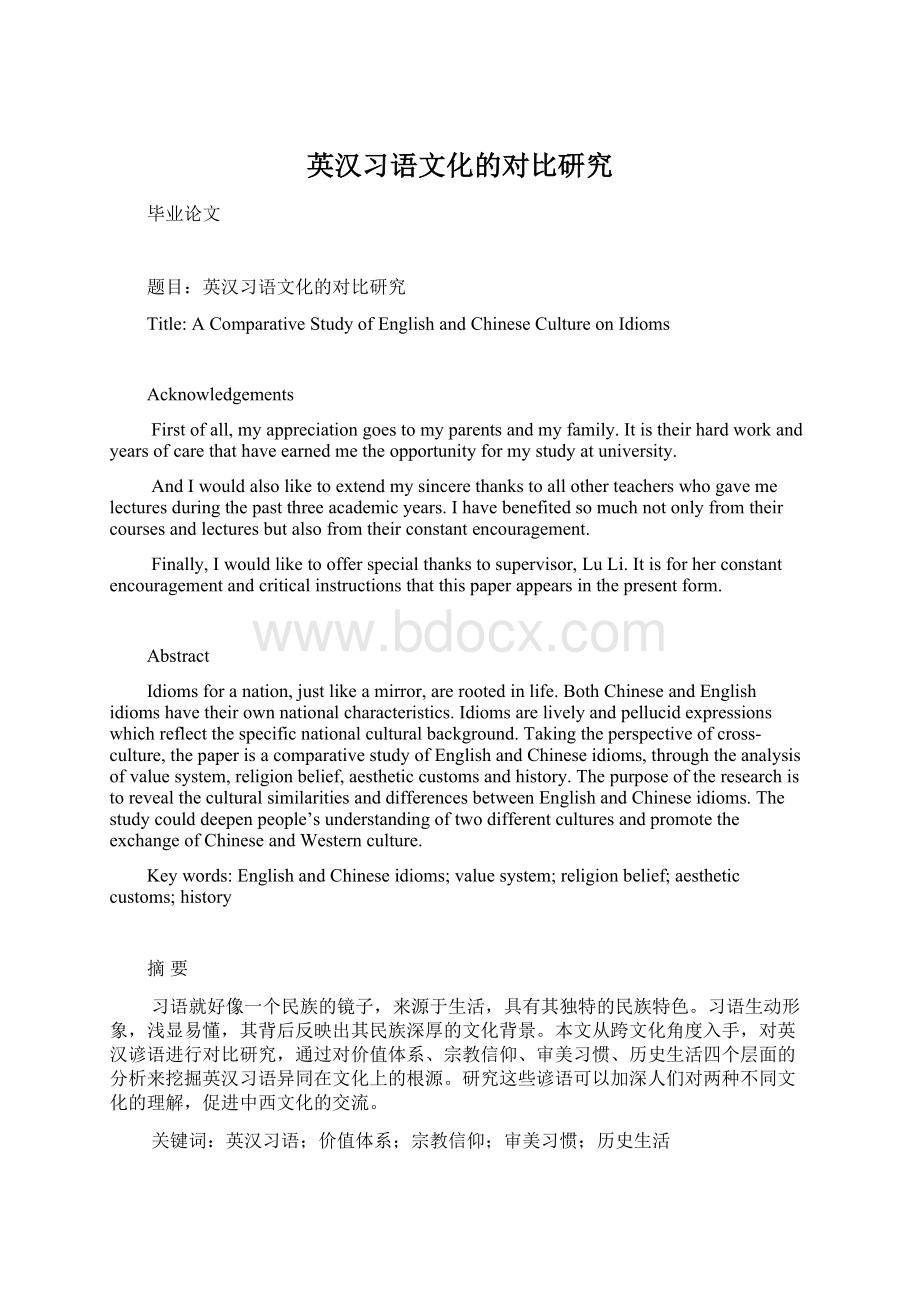 英汉习语文化的对比研究.docx
英汉习语文化的对比研究.docx
- 文档编号:4355908
- 上传时间:2022-11-30
- 格式:DOCX
- 页数:11
- 大小:33.96KB
英汉习语文化的对比研究.docx
《英汉习语文化的对比研究.docx》由会员分享,可在线阅读,更多相关《英汉习语文化的对比研究.docx(11页珍藏版)》请在冰豆网上搜索。

英汉习语文化的对比研究
毕业论文
题目:
英汉习语文化的对比研究
Title:
AComparativeStudyofEnglishandChineseCultureonIdioms
Acknowledgements
Firstofall,myappreciationgoestomyparentsandmyfamily.Itistheirhardworkandyearsofcarethathaveearnedmetheopportunityformystudyatuniversity.
AndIwouldalsoliketoextendmysincerethankstoallotherteacherswhogavemelecturesduringthepastthreeacademicyears.Ihavebenefitedsomuchnotonlyfromtheircoursesandlecturesbutalsofromtheirconstantencouragement.
Finally,Iwouldliketoofferspecialthankstosupervisor,LuLi.Itisforherconstantencouragementandcriticalinstructionsthatthispaperappearsinthepresentform.
Abstract
Idiomsforanation,justlikeamirror,arerootedinlife.BothChineseandEnglishidiomshavetheirownnationalcharacteristics.Idiomsarelivelyandpellucidexpressionswhichreflectthespecificnationalculturalbackground.Takingtheperspectiveofcross-culture,thepaperisacomparativestudyofEnglishandChineseidioms,throughtheanalysisofvaluesystem,religionbelief,aestheticcustomsandhistory.ThepurposeoftheresearchistorevealtheculturalsimilaritiesanddifferencesbetweenEnglishandChineseidioms.Thestudycoulddeepenpeople’sunderstandingoftwodifferentculturesandpromotetheexchangeofChineseandWesternculture.
Keywords:
EnglishandChineseidioms;valuesystem;religionbelief;aestheticcustoms;history
摘要
习语就好像一个民族的镜子,来源于生活,具有其独特的民族特色。
习语生动形象,浅显易懂,其背后反映出其民族深厚的文化背景。
本文从跨文化角度入手,对英汉谚语进行对比研究,通过对价值体系、宗教信仰、审美习惯、历史生活四个层面的分析来挖掘英汉习语异同在文化上的根源。
研究这些谚语可以加深人们对两种不同文化的理解,促进中西文化的交流。
关键词:
英汉习语;价值体系;宗教信仰;审美习惯;历史生活
Contents
Introduction……………………………………………………………1
.Theconceptofidioms………………………………………………...1
1.1Definitionofidioms………………………………………………..1
1.2Culturalbackgroundofidioms…………………………………….2
.DifferentvaluesystemsinChinaandwesterncountries……………..2
2.1Individualisminwesterncountries………………………………...3
2.2CollectivevaluesinChina…………………………………………3
III.Differentreligionbeliefs……………………………………………4
3.1Christianityinwesterncountries………………………………….4
3.2ConfucianisminChina…………………………………………….5
.Differentaestheticcustoms………………………………………….6
4.1Conceptiononanimals…………………………………………….6
4.2Conceptiononcolors………………………………………………7
4.3Conceptiononage…………………………………………………9
.Differenthistoryandtradition……………………………………….9
5.1Storiesfromhistory………………………………………………..9
5.2Differentculturaltraditions……………………………………….10
5.3Differenthabitsindailylife………………………………………11
Conclusion..............................................................................................12
Bibliography…………………………………………………………...14
Introduction
Asweallknow,languageislikeabridgeoverdifferentpeopleanddifferentculturesintheworld.Idioms,asaspecialpartoflanguage,containalargeamountofinformationofhistories,geography,cultureandsoon.Theyaretheheritageofhistoryandproductofculturalevolvement.ChineseandEnglisharetwoofthemostinfluentiallanguagesintheworld.China,asoneofthecivilizedancientcountries,hasalonghistoryofmorethanfivethousandyearswithalargepopulationandanimmenseterritory.TheGreatBritain,asthehometownofIndustrialRevolutionandanimportantcountryinEurope,alsohasalonghistory.Wecanlearnaboutthecultureafterwestudyabouttheidiomsandknowmoreabouttheculturalbackground.FrancisBaconsaid,“Generouswitandspiritofanationarediscoveredbytheiridioms”[1:
35].ComparingthedifferentculturesonEnglishandChineseidiomswillhelpushaveabetterunderstandingondifferencesandsimilaritiesofthetwolanguagesinthecross-culturalcommunicationandtranslation.
I.Theconceptofidioms
1.1.Definitionofidioms
Idiomsaretheessenceofalanguage,whicharealwaysphilosophicalandeternal.AccordingtoOxfordAdvantagedLearner’sEnglish-ChineseDictionary,anidiomis“aphraseorsentencewhosemeaningisnotclearfromthemeaningofitsindividualwordsandwhichmustbelearntasawholeunit”.“Inthebroadsense,idiomsmayinclude:
setphrases;proverbs;sayings;epigrams;slangexpressions;colloquialisms;quotations;two-partallegoricalsayings,ofwhichthefirstpart,alwaysstated,isdescriptive,whilethesecondpart,sometimesunstated,carriesthemessage(chieflyinChinese).[1:
71]WhileinChinese,idiomsarecalledas‘熟语’,including:
短语,成语(usuallyconsistingoffourwords),俗语,谚语,格言,箴言,名言(quotationorrecordedutterance),警句,隽语,俚语,粗话,行话,歇后语(includingpun),习语.”
1.2Culturalbackgroundofidioms
BothChinaandBritainhavealonghistory,whichfertilizedtheirbrilliantcultures.
Thecommonexperiencesandreciprocalinteractioninvariousaspectsthroughlong-timecommunicationbetweenthetwocountriesinducealotofcommonpointsinculture.
InearlyBritishhistory,BritainwasoccupiedbytheRomanEmpirefornearlyfourhundredyears.TheRomanslefttheirdeepmarksonBritainculture.In49B.C.theRomanemperorCaesarsenttheorderofburningoutboatsafterhisarmypassedLupigenRiver,showingthedeterminationtotakeaall-outwar.ThatistheoriginoftheEnglishidiom'burnone’sboat’[12:
3].Incidentally,in208B.C.GeneralXiangyuinChinasentthesimilarordertosmashalltheboatsafterthearmypassedRiverZhanginattempttoshowitsdeterminationofwinningthewar,whichmadethebirthoftheChineseidiom'破釜沉舟’[14:
11].Thetwoidiomsarestunninglythesameinformandmeaning,whichreflectthesamepointinculture------thesameconcepttoshowinexorabledeterminationorirrevocabledecision.
EnglishidiomsandChineseidiomsaregemsofthetwolanguagesaswellasthecrystallizationofthetwonationalcultures.Mostofidiomsareofvividimageswhichareappropriatelyusedtocomparetootherthings,consequently,theyoftencontaindistinctivenationalandlocalcolors.Someidiomshavequiteclearmeanings;someareimplicitandprofound,whichcouldcauseagreatdealofassociation,whileothersmayincludeseveralmeanings,whichdependonthecontexttodefineitsrealindication.
BothEnglishandChineseidiomshavetheirnationalcharacteristics.Theyreflectdifferentthevaluesystems,thereligionbeliefs,theaestheticcustoms,andthehistoryandtradition.
II.DifferentvaluesystemsinChinaandwesterncountries
2.1.Individualisminwesterncountries
Differentpeoplehavedifferentvalues.Itisadesirablepointofconsiderationandevaluationfordifferentpeople.Inwesterncountries,themainlineofvalueisindividualism;theyadvocatetheindependenceofthecommunity.Forexample,“don’tputyourfingerinthepie(不要多管闲事)”itpresenttheLifePhilosophyofindividualisminwesterncountries.Ittellspeopledonotcareaboutothers;thebestwayismindyourownbusiness.
Individualisminwesterncountriesisalsoreflectedinpeople’stimesystem,theypursuitforefficiencyandbeoptimistic.Forexample,“timeismoney(时间就是金钱)”likeaChineseidiom“一寸光阴一寸金”,ittellspeoplethattimeislimited,weshoulduselimitedtimetodounlimitedthings,createmoreusefulthingsforothers,thisidiomisalsofullofeconomiccolor.“punctuallyisthepolitenessofkings(守时乃帝王之理)”and“punctuallyisthesoulofbusiness(恪守时刻,为立业之本)”alsoreflectpunctualityhasbecameadvocatedinwesterncountries.AlthoughinChineseidiomwesay“浪费时间等于谋财害命”,generallyspeaking,Chinesepeople’spunctualityisweakerthanwesterncountries’.TobeaffectedbyIndividual-basedvalues,peoplepaymoreattentiontotheirownprivacy,suchasages,incomes,religionbelieveandindividualhousing.AsanEnglishidiomsays“anEnglishman’shomeishiscastle(英国人的家是独立王国)”.
2.2.CollectivevaluesinChina
ContrarytoIndividualisminwesterncountries,CollectivevaluehasbecomeadvocatedinChina.CollectivevalueisthemainlineinChineseculture.TobeaffectedbyCollectivevalue,humanrelationbasedhasaspecialstationinChineseidiom;itreflectsinthespiritofcooperationamongpeople,itistheresultofovertwenty-fivehundredhistoryofChina.Forexample,“一个篱笆三个桩,一个好汉三个帮”,“众人拾柴火焰高”and“独木不成林,单丝难成缕”,theyallreflectarepreventativeforceofcollective.Thisrelationalsoreflectthecloserelationbetweenaffectionandrelationship,peopleusuallytendtothereturnofaffectionandrelationshipandpayattentiontothefriendshipandobligationsfromeachothers.“一日为师终生为师”tellstheChinesetraditionalrelationshipbetweenteachersandstudents.“谁言寸草心”expressesthechildren’skindhearttohowmuchtheirparentsowetothem.And“士为知己者死”tellsusthepersonalloyaltyandobligationbetweengoodfriends.Humanrelationbasedreflectsintherelationshipbetweentheindividualandthecollective,Chineseclaim“个人服从集体,小家服从大家”,sotheyhavetheloftyideaofcollectivism“先天下之忧而忧,后天下之乐而乐”.Asawhole,collectivevaluehasaspecialstationinChineseculture.
III.Differentreligionbeliefs
3.1Christianityinwesterncountries
Religionplaysanimportantroleinthedevelopmentofthelanguage.Differentreligionsproducedifferentidioms.Differentcountriessharedifferentcustomsandbeliefs.Itiscertainlymucheasiertolearnaboutotherculturesifoneapproachesthem.Forexample,mostEnglishpeoplebelievethatitiscommontocommunicatewitheachotherineuphemism,inordernottoleadtoawkwardnessandembarrassment.Therefore,thefollowingexamplesillustratesomekindsof“die”;mostofexamplesarethesametoourcountry.
Togotoglory升天了
TobegoneorToexpire逝世
TodepartorTopassaway去世,与世长辞
Toclose(end)one’sday寿终
Tobreatheone’slast咽气,断气
Togowest归西天
Topaythedebtofnature了结尘缘
Todeparttotheworldofsh
- 配套讲稿:
如PPT文件的首页显示word图标,表示该PPT已包含配套word讲稿。双击word图标可打开word文档。
- 特殊限制:
部分文档作品中含有的国旗、国徽等图片,仅作为作品整体效果示例展示,禁止商用。设计者仅对作品中独创性部分享有著作权。
- 关 键 词:
- 英汉 习语 文化 对比 研究
 冰豆网所有资源均是用户自行上传分享,仅供网友学习交流,未经上传用户书面授权,请勿作他用。
冰豆网所有资源均是用户自行上传分享,仅供网友学习交流,未经上传用户书面授权,请勿作他用。


 如何打造酒店企业文化2刘田江doc.docx
如何打造酒店企业文化2刘田江doc.docx
